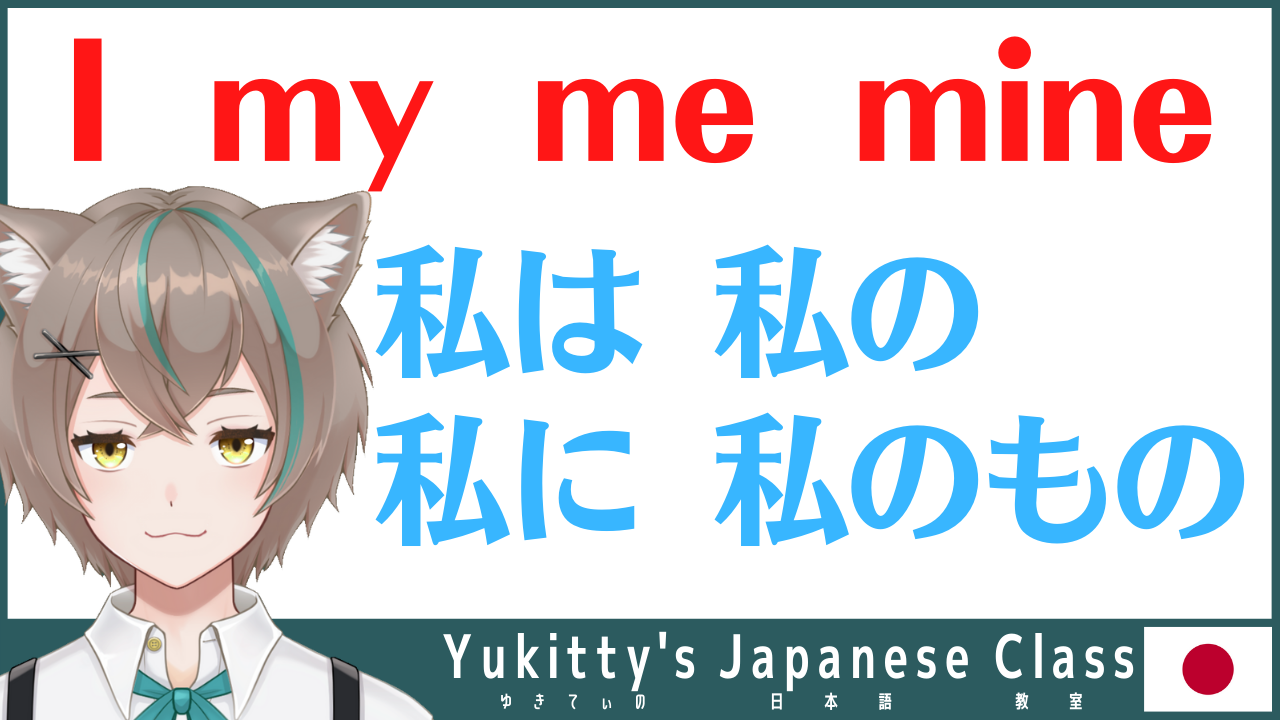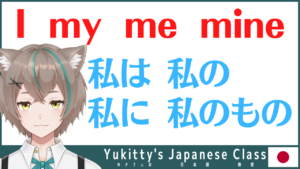


“I, my, me, mine” in Japanese is expressed by a combination of 2 words, a pronoun, and a postpositional particle.
There are rules for this combination, so you only have to remember the rules.
| Pronoun | Nominative case (I) | Possessive case (my) | Objective case (me) | Possession objective case (mine) | |
|---|---|---|---|---|---|
| rule | – | +は | +の | +に +を | +のもの |
| I | 私 | 私は | 私の | 私に 私を | 私のもの |
| you | あなた | あなたは | あなたの | あなたに あなたを | あたなのもの |
| he | 彼 | 彼は | 彼の | 彼に 彼を | 彼のもの |
| she | 彼女 | 彼女は | 彼女の | 彼女に 彼女を | 彼女のもの |
| it | それ | それは | その | それに それを | その |
| we | 私たち | 私たちは | 私たちの | 私たちに 私たちを | 私たちのもの |
| you (plural) | あたたたち | あなたたちは | あなたたちの | あなたたちに あなたたちを | あなたたちのもの |
| they ♂ | 彼ら | 彼らは | 彼らの | 彼らに 彼らを | 彼らのもの |
| they ♀ | 彼女ら | 彼女らは | 彼女らの | 彼女らに 彼女らを | 彼女らのもの |
| they (things) | それら | それらは | それらの | それらに それらを | それらの |
All nominative “は” is pronounced “wa”.
Please note that the words highlighted in yellow deviate from the basic rules.

Japanese people don’t use pronouns much in the first place. If it is clear who the subject or object is, omit it, and if not, use the person’s name. In particular, “you”, “he”, and “she” are rarely used, so it sounds a little emphasized when used.
I handed him her letter.
手紙 [noun] letter
渡す [verb] hand [past tense] 渡した
Their feelings are yours.
気持ち [noun] feelings, sensation, intention, mood



The following words all mean “I” in Japanese. *The listed parameters are just my opinion.
| deformation | ♂ | ♀ | kids | youth | adult | aged | formal | peculiarity |
|---|---|---|---|---|---|---|---|---|
| 私 | **** | ***** | ** | *** | ***** | ***** | **** | formal |
| 私 | *** | *** | * | * | *** | *** | ***** | most formal |
| 俺 | ***** | * | ** | ***** | **** | *** | ** | casual |
| 僕 | ***** | * | **** | ***** | *** | ** | *** | semi-formal |
| あたし | * | ***** | *** | **** | *** | ** | *** | casual |
| あたい | * | ** | ** | ** | ** | * | * | countryside |
| うち | ** | ***** | *** | **** | *** | ** | ** | casual |
| 自分 | *** | ** | * | *** | *** | * | *** | casual |
| 吾輩 | ** | * | * | ** | ** | ** | *** | retro |
| わし | ** | ** | * | * | ** | *** | ** | aged style |
| わい | ** | * | * | ** | ** | * | ** | Osaka style |
| わて | ** | ** | * | ** | ** | * | ** | Osaka style |
| わ | ** | * | * | * | ** | ** | ** | Okinawa style |
| わらわ | * | ** | * | * | ** | ** | ** | retro |
| わっち | * | ** | * | ** | ** | * | * | retro |
| あっし | ** | ** | * | ** | ** | * | * | retro |
| おら | ** | * | ** | ** | * | * | * | countryside |
| おいら | ** | * | ** | ** | * | * | * | countryside |
| おれっち | ** | * | ** | ** | ** | * | * | Shizuoka style |
| 拙者 | ** | * | * | * | ** | ** | **** | retro |
| 小生 | ** | * | * | * | ** | ** | ***** | formal |
| まろ | * | * | * | * | * | * | ** | retro |
| ミー | ** | * | * | ** | ** | * | ** | foreigner |



The following words mean “you” in Japanese. *The listed parameters are just my opinion.
| deformation | ♂ | ♀ | kids | youth | adult | aged | formal | peculiarity |
|---|---|---|---|---|---|---|---|---|
| あなた | **** | **** | * | *** | ***** | **** | **** | formal |
| あんた | ** | *** | ** | *** | *** | *** | * | familiar, rude |
| 君 | **** | *** | ** | *** | *** | *** | ** | familiar |
| お前 | ** | ** | * | *** | *** | *** | * | familiar, rude |
| てめえ | *** | * | * | ** | ** | * | * | hostile |
| そちら | *** | *** | * | * | ** | ** | *** | casual |
| おたく | ** | *** | * | * | ** | ** | ** | casual |
| 自分 | ** | ** | * | ** | ** | * | ** | casual |
| 貴様 | * | * | * | ** | ** | ** | * | hostile |
| 貴殿 | * | * | * | * | ** | ** | ***** | retro formal |
| お主 | * | * | * | * | ** | ** | ** | retro |
| なんじ | * | * | * | * | ** | ** | * | retro |
| ユー | * | * | * | ** | ** | * | ** | foreigner |
お前の妹は美人だよ
鬼滅の刃 ©吾峠呼世晴/集英社・アニプレックス・ufotable
Your sister is beautiful.
妹 [noun] younger sister
美人 [noun] beauty (美しい [I-Adjective] beautiful + 人 [noun] person )
僕は君に会うために生まれてきたのかもしれない
新世紀エヴァンゲリオン ©カラー/Project Eva.
I may have been born to meet you.
会う [verb] meet
生まれてきた [verb] was born (生まれる [verb] born + きた [verb][past] came)
かもしれない [auxiliary verb] may (かも [postpositional particle] may + しれない [verb][negative] be not known)
Translate the following sentences into Japanese.
My pen and her pen were given by him.
_____ペンと_____ペンは_____もらいました。
My pen and her pen were given by him.
私のペンと彼女のペンは彼にもらいました。
We asked him to call your mother.
_____ _____ _____のお母さんを呼ぶように頼んだ。
We asked him to call your mother.
私たちは彼にあなたのお母さんを呼ぶように頼んだ。


この記事が気に入ったら
フォローしてね!
Comment